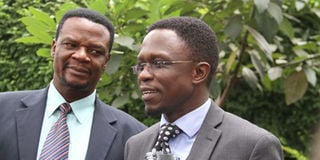Ababu must weigh his words carefully before uttering them

Budalang’i MP Ababu Namwamba (right) with his Sirisia counterpart, Mr John Waluk, at a past event. The two held several political meetings with leaders at the Coast over the weekend, seeking to popularise a middle-ground political alliance. FILE| NATION
What you need to know:
- As long as the chairman and the scribe purport to speak for the ODM, they owe its mass a certain degree of uniformity of thought expressed with care, decency and mutual respect.
- Kenyans find themselves in the extremely embarrassing situation in which the two ODM factions throw much sharper arrows at each other than they throw at the ruling house.
- While each party must appear generally united on its broadest policy outlines, it must also allow outlets of personal or group expression of dissent.
A political party is like a religious sect. Every member must abide by a stringent code of conduct or face excommunication. Concerning Kenya’s Orange Democratic Movement (ODM), therefore, the question dogs you like Medusa’s face. Why won’t chairman Raila Odinga and scribe Ababu Namwamba speak with one voice?
If the opposition party’s two highest leaders will not discipline their own tongues, how do they expect their rank and file to behave differently? As long as the chairman and the scribe purport to speak for the ODM, they owe its mass a certain degree of uniformity of thought expressed with care, decency and mutual respect.
If the opposition party’s two paramount chiefs are perennially at loggerheads and publicly throw the most hideous oral stones at each other, how can they call themselves a party?
How can they say that theirs is a single well-defined political mission? I ask because the ruling alliance of parties should be seen as the ODM’s chief target of criticism.
Yet, every day that the sun rises in the east, the two ODM paramount chiefs throw the sharpest spears only at each other, never at their purported political adversaries. Kenyans now find themselves in the extremely embarrassing situation in which the two ODM factions throw much sharper arrows at each other than they throw at the ruling house.
The perennial exchange of acidic words between the two ODM factions raises a salient question: What exactly are they quarrelling about? Do they differ on definitive social management policies? In other words, is the widening gap ideological? Or do they differ only on procedural questions? The answer does not emerge from the mouths of Raila Odinga and Ababu Namwamba.
APPEAR UNITED
Even the question of procedures does not seem to arise. No, I do not advocate a monolithic tower of theory and practice for any party, whether ruling or in opposition. The point, however, is that, while each party must appear generally united on its broadest policy outlines, it must also allow outlets of personal or group expression of dissent.
Unity of purpose – even the mere appearance of it – is of paramount importance because it is what the party can advertise to attract potential members and voters. But internal freedom to differ is also paramount both between and with the party’s chiefs concerning particular social questions whenever these arise.
Of course, each party may have set up a general container into which policy initiatives and suggestions can be deposited and from which these can then be freely examined, freely debated and freely decided upon. But cohesiveness and national respectability demand another discipline – a seemingly contradictory one.
It is that every party must set up a behavioural ceiling above which no member or faction will rise. To be sure, to set up such a ceiling is to contradict the liberal Western world’s chief myth of democracy, namely, that the freedoms of expression, movement, voting, etc, are absolute and cannot be limited by any necessity.
In short, for any organisation to be effective, the concept of freedom must be defined as closely as possible. That is where the essential contradiction lies.
For to define is necessarily to limit (both in meaning and in boundary). To define is to set external borders beyond which no member of the concerned community is allowed.
Concerning movement, for example, to define is to limit the areas into which a person can enter without offending the freedoms of others to make similar movements. Yet, even within a monolithic party, freedom of speech is a natural necessity.
Without it – for one thing only – anger will accumulate until it reaches a point when it must burst forth, with devastating general consequences. That is why, as long as he speaks for a human mass as large as the ODM’s membership, Ababu Namwamba must weigh his words and control his temper.





